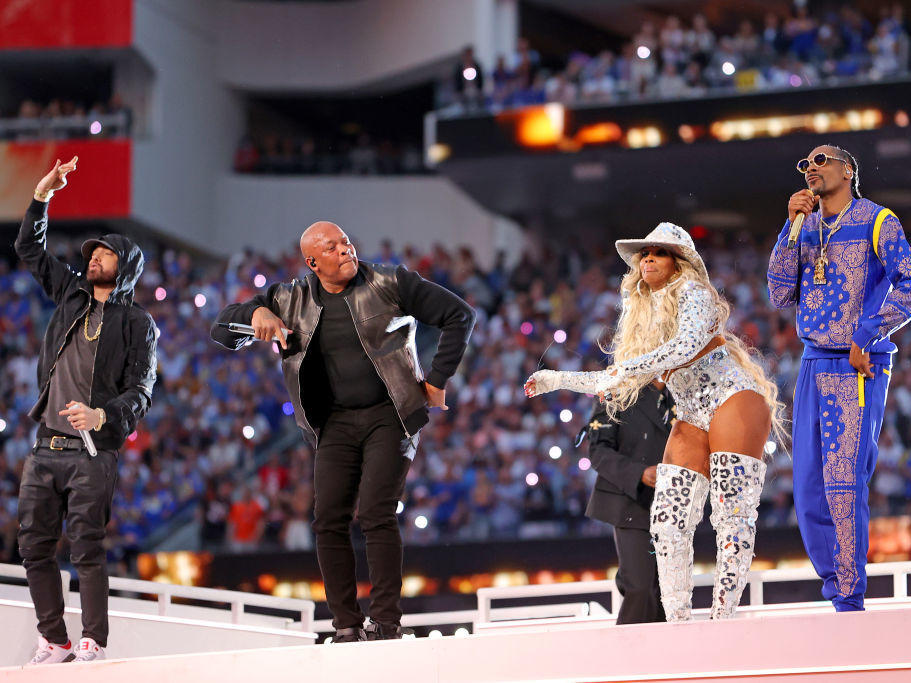Section Branding
Header Content
The Super Bowl's biggest moments, beyond the touchdowns
Primary Content
The Los Angeles Rams weren't the only big winners in Sunday's Super Bowl against the Cincinnati Bengals.
Other standouts including a halftime show by rap royalty and a slew of star-studded advertisements. Here are some of those memorable moments.
How the Rams won
The Rams beat the Bengals 23-20, ending the nail-biter with a last-minute touchdown and marking the second straight year a team has won the Super Bowl on its home turf.
L.A. had a strong start, but the Bengals kept the game close and took the lead on the first offensive play of the second half.
The coin toss honored the legacy of Title IX
Tennis legend and California native Billie Jean King kicked off the game with the honorary coin toss, which carried a special symbolism this year.
King has 39 Grand Slam titles to her name, including a record 20 from Wimbledon. She famously defeated Bobby Riggs in 1973's "Battle of the Sexes," and opened doors for future generations of female players by fighting for more recognition and better pay.
She joined the team captains of the California School for the Deaf, girls youth tackle football players from the Inglewood Chargers and Watts Rams, and high school girls from the Flag Football League of Champions to honor the 50th anniversary of Title IX, which provides equal federal funding for men's and women's high school and collegiate sports. King narrated a video tribute celebrating the law's legacy before walking onto the field.
"It is an honor to stand with these outstanding student athletes and celebrate the 50th anniversary of Title IX on one of the world's biggest stages," she said in a statement. "It's hard to understand inclusion until you have been excluded, and I am proud to be part of this year's Super Bowl Coin Toss and the NFL's commitment to bring us together and make us stronger."
Mickey Guyton — remember her name — belted the national anthem
Country singer Mickey Guyton drew widespread praise for her gorgeous rendition of "The Star-Spangled Banner."
It was an honor many years in the making for the breakout star, who grew up singing in church choirs and earned the nickname "the national anthem girl" in high school because she performed it so many times.
Guyton released her debut album last September and then became the first- ever Black artist to receive a Grammy nomination for Best Country Album of the Year (in addition to two other nominations).
She spoke to NPR's Morning Edition and World Cafe last fall about her experience finding her voice and navigating the country music scene as a Black woman, after a decade of experiencing racism and feeling forced to conform in Nashville.
She wasn't the only songstress who shone on the field: Singer Jhené Aiko performed "America the Beautiful."
Unfortunately, the two singers got mixed up when Guyton was captioned incorrectly as Aiko, a mistake that social media users noticed right away. NBC has apologized to both artists for the error.
The fumble brings a whole new meaning to the title of Guyton's debut album: Remember Her Name.
Rap took center stage, and Eminem took a knee
Fans went wild for the halftime show, in which a stacked roster of hip-hop, R&B and rap legends brought renewed energy to their old-school hits — firing up the early-aughts nostalgia and fueling some generational debates on social media.
The performance was headlined by California icons Dr. Dre, Snoop Dogg and Kendrick Lamar, as well as New York's Mary J. Blige and 50 Cent and Detroit's Eminem, who finished his song with what appeared to be a protest statement.
Eminem took a knee for about 50 seconds at the end of his solo set, which many fans interpreted as an act of solidarity with Colin Kaepernick and other athletes who have kneeled during the national anthem to protest racial injustice and police brutality.
Kaepernick first started kneeling in 2016, and many other players across sports followed suit the next year in response to disparaging remarks by former President Donald Trump.
Ads focused on celebrities, humor, nostalgia and special effects
NPR TV critic Eric Deggans notes that the modern Super Bowl viewer has much to bemoan, or at least be skeptical about — from allegations of racism in the NFL and concerns about the long-term impacts of players' head trauma to the general state of the pandemic and economy.
He says most ads didn't exactly rise to meet the moment, focusing on celebrities, humor, nostalgia and other tactics to entertain and intrigue.
"The result was a batch of mostly middling commercials that didn't really feel tethered to much," he writes. "They didn't offer unbridled partying or celebration, but weren't often serious or poignant enough to speak to the modern moment, either."
Deggans unpacked a sampling of "the hippest, most entertaining, most telling ads of the Big Game" — from the highs (Lindsay Lohan! A celebrity power couple hawking Amazon Alexa!) and the lows (Pringles nightmares, anyone?). Read his review here.
One memorable ad from UberEats, featuring a cast of celebrities chowing down on things like detergent, a lightbulb and a candle (to emphasize that it delivers more than just food) even prompted a warning from the U.S. Consumer Product Safety Commission's twitter account: "Do not eat soap."
A version of this story originally published in the Morning Edition live blog.
Copyright 2022 NPR. To see more, visit https://www.npr.org.
Correction
An earlier version of this story incorrectly stated that Eminem was born in Detroit. In fact, he was born in St. Joseph, Mo.
Bottom Content

